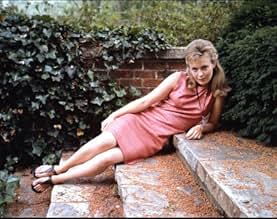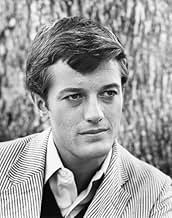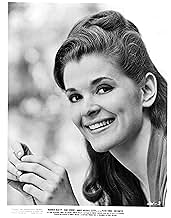IMDb RATING
6.8/10
3.5K
YOUR RATING
A war veteran gets work at a mental institution, where he meets the beautiful and eccentric Lilith.A war veteran gets work at a mental institution, where he meets the beautiful and eccentric Lilith.A war veteran gets work at a mental institution, where he meets the beautiful and eccentric Lilith.
- Director
- Writers
- Stars
- Awards
- 2 nominations total
Walter Arnold
- Lonely Girl's Father
- (uncredited)
Rene Auberjonois
- Howie
- (uncredited)
Elizabeth Bader
- Girl at Bar
- (uncredited)
Ruth Baker
- Patient
- (uncredited)
Janet Banzet
- Patient
- (uncredited)
Amelie Barleon
- Patient
- (uncredited)
Carson Barnes
- Child Crossing Street
- (uncredited)
Jeanne Barr
- Miss Glassman
- (uncredited)
David Barry
- Ambulance Attendant
- (uncredited)
- Director
- Writers
- All cast & crew
- Production, box office & more at IMDbPro
Featured reviews
Beautiful, involving and at times lyrical film with early performances from Warren Beatty and Gene Hackman. Beatty was, of course, moving fast and would have Hackman with him a couple of years later in Bonnie and Clyde. But here is a much more subdued and thoughtful young star seemingly happy to allow the devastatingly overlooked Jean Seberg show here just what she could do and how she might have become a much bigger star. Peter Fonda also impresses as a fellow inmate with Seberg as he tries to enlist Beatty as a go between. The trainee staff member is already, himself, bewitched by the lovely Lileth (Seberg) however which will have tragic repercussions. The director was much admired in Europe and Seberg had sparkled before with Goddard so the fact the film looks a little more European than American at times should not be so surprising. There is a sinister air to this tale of life in a private insane asylum but whilst we get shots of damaged spider webs and the staring eyes and groping hands of patients we also get flowing water, reflections of the sun and trees and ladies dresses. We know this will not end well but such are the performances and cinematography as well as sharp eyed direction, this is always a pleasure for we too become entranced by the devilish doings of the crazy lovely as personified by Jean Seberg in her finest performance.
Jean Seberg was a woefully inadequate actress in almost every role in which she was cast but she seemed born to play Lilith, the unstable, deeply amoral 'heroine' of Robert Rossen's last film. It's an extraordinary performance and it's extraordinary because it doesn't appear to have anything to do with 'acting'; it just seems to exist. The theme of the film is madness, not 'mental illness' but madness in the truly Shakespearean sense of the word, and everything about the film is heightened, a little unreal. Eugen Schufftan photographs the film in a hazy monochrome with the emphasis on white. We peer at the characters through shafts of sunlight, (and there is a lot of water on view, too).
And Seberg isn't the only extraordinary performance. There is excellent work, too, from Warren Beatty as the young nurse drawn into Lilith's web, Kim Hunter as the woman who runs the institution where Lilith is housed and Peter Fonda, (the best of his early performances) as another patient obsessed with Lilith. Indeed the whole cast, (which includes a brilliant, early cameo from Gene Hackman), is working at the top of their form.
The film is an adaptation of a J R Salamanca novel but Rossen renders it in wholly visual terms. He uses his camera the way an artist uses his canvas to convey the inner lives of his characters. It isn't a total success. There are times when it dissolves into hysteria and the symbolism tends to get a bit top-heavy, but it is still a fearless, totally uncommercial movie, possibly it's director's best, and a key American movie of the sixties.
And Seberg isn't the only extraordinary performance. There is excellent work, too, from Warren Beatty as the young nurse drawn into Lilith's web, Kim Hunter as the woman who runs the institution where Lilith is housed and Peter Fonda, (the best of his early performances) as another patient obsessed with Lilith. Indeed the whole cast, (which includes a brilliant, early cameo from Gene Hackman), is working at the top of their form.
The film is an adaptation of a J R Salamanca novel but Rossen renders it in wholly visual terms. He uses his camera the way an artist uses his canvas to convey the inner lives of his characters. It isn't a total success. There are times when it dissolves into hysteria and the symbolism tends to get a bit top-heavy, but it is still a fearless, totally uncommercial movie, possibly it's director's best, and a key American movie of the sixties.
Jean Seberg is absolutely captivating in this film. Yes despite the wig she wears, due to the fact her hair was cropped short for her previous films, she is as lovely as ever. One of my favorite films of all time and certainly the best one that deals with insanity in and honest and true way, not only avoiding the cliché' but completely reversing it and debunking the stereotype. Robert Rossen is a great director, one of history's most under-appreciated and few others could helm this story the way he does. Based on the novel by J.R. Salamanca, the story is of a young war vetern who returns home and seeks a job at the local mental institute. There he gets too involved with several of the patients and learns much about their past, which reflects the tragedy in his own life involving his mother.
It's true Warren Beatty does play the role blandly and stiff. While that's a turn off for many people watching the film, I think they fail to understand that just like Ryan O'Neil in Barry Lyndon, it's the character they're playing. Not the actor and certainly not the direction. Wonderful supporting cast from Kim Hunter and Peter Fonda as well as a brilliant cameo by Gene Hackman, which oozes of a marriage gone sour in his bit part.
It's a very hard film to figure out because so much is left untold and rightfully so leaving the audience to decide what happened. Playing on the fable of the past coming back to haunt us it plays deeply on buried memories and traumatic life experiences that were covered up rather than confronted. There is so much positive to say about this amazing film, but even so it's actress Jean Seberg that is the crown jewell in this picture. Criminally underseen, now that it is on DVD anyone interested in deep character studies should make it a point to watch this ASAP.
It's true Warren Beatty does play the role blandly and stiff. While that's a turn off for many people watching the film, I think they fail to understand that just like Ryan O'Neil in Barry Lyndon, it's the character they're playing. Not the actor and certainly not the direction. Wonderful supporting cast from Kim Hunter and Peter Fonda as well as a brilliant cameo by Gene Hackman, which oozes of a marriage gone sour in his bit part.
It's a very hard film to figure out because so much is left untold and rightfully so leaving the audience to decide what happened. Playing on the fable of the past coming back to haunt us it plays deeply on buried memories and traumatic life experiences that were covered up rather than confronted. There is so much positive to say about this amazing film, but even so it's actress Jean Seberg that is the crown jewell in this picture. Criminally underseen, now that it is on DVD anyone interested in deep character studies should make it a point to watch this ASAP.
7YAS
One of the great pleasures of watching older films is that, beyond the obvious joys of character and plot, they also offer us a look past the films' action and into the world in which they were made: the fashions of dress, design, and social attitude that prevailed at the time. All of this "background," so taken for granted by the filmmakers in their day, can, when seen across a focal space of time and social change, reveal fascinating elements unguessed-at when the films were made.
So it is with LILITH. Other comments on this film have more than adequately discussed the plots and motivations of the characters; what I found unexpectedly mesmerizing and appalling was its view of the mental institution of the mid-1960s. Warren Beatty's character has no experience in such a setting, but he'd like to "help people," so he's hired on the spot and immediately put in charge of patients who, by definition, aren't responsible for their own actions. The inmates seem to be mostly left to do as they please, whether it be teetering at the edge of a precipitous cliff or wandering off in the woods, easily slipping away from their inattentive keepers.
When Beatty's character begins to be attracted to Lilith, the chief shrink calls him in and asks if this is the case. "No, I don't think so," says Beatty, patently lying through his teeth. "Well," says Dr Big reassuringly, "it's not unheard-of for patients to fall in love with the orderlies, and sometimes, unfortunately, it happens the other way as well." And that's that: with this appalling (to modern-day ears, at any rate) bit of 'advice,' or possibly nudge-wink encouragement, he pats the oafish horndog on the back, tells him he's doing a great job, and sends him off to town on yet another date with Lilith. Whenever Beatty does express concern about anything job-related, the medical staff just interrupts him with "don't worry, you're doing a fine job" and gently shoos him out.
What a different world it was, forty years ago! Mind you, I'm not judging the film by social standards that never occurred to its time; indeed, the things it reveals about the 'care' of mental patients in 1963 are what made it most interesting to me. All the characters are either entertainingly insane or arrestingly clueless idiots, and Lilith herself is a sufficiently complex and compelling character to make this melodrama watchable all on her own.
So it is with LILITH. Other comments on this film have more than adequately discussed the plots and motivations of the characters; what I found unexpectedly mesmerizing and appalling was its view of the mental institution of the mid-1960s. Warren Beatty's character has no experience in such a setting, but he'd like to "help people," so he's hired on the spot and immediately put in charge of patients who, by definition, aren't responsible for their own actions. The inmates seem to be mostly left to do as they please, whether it be teetering at the edge of a precipitous cliff or wandering off in the woods, easily slipping away from their inattentive keepers.
When Beatty's character begins to be attracted to Lilith, the chief shrink calls him in and asks if this is the case. "No, I don't think so," says Beatty, patently lying through his teeth. "Well," says Dr Big reassuringly, "it's not unheard-of for patients to fall in love with the orderlies, and sometimes, unfortunately, it happens the other way as well." And that's that: with this appalling (to modern-day ears, at any rate) bit of 'advice,' or possibly nudge-wink encouragement, he pats the oafish horndog on the back, tells him he's doing a great job, and sends him off to town on yet another date with Lilith. Whenever Beatty does express concern about anything job-related, the medical staff just interrupts him with "don't worry, you're doing a fine job" and gently shoos him out.
What a different world it was, forty years ago! Mind you, I'm not judging the film by social standards that never occurred to its time; indeed, the things it reveals about the 'care' of mental patients in 1963 are what made it most interesting to me. All the characters are either entertainingly insane or arrestingly clueless idiots, and Lilith herself is a sufficiently complex and compelling character to make this melodrama watchable all on her own.
10sabalo
This is one of those films that managed to leave an enduring impression on me and I've seen it quite a few times since finding it quite by chance. It reminds me of that other great unknown the Ninth Configuration. It tells the story of a troubled ex soldier who goes to work at an asylum and quite unexpectedly loses himself in the world of one of the patients - Lilith. Jean Seberg is quite simply out of this world, her every gaze and expression drawing you the viewer in. It's easy to see how both Vincent and another patient Stephen, an introverted young man, are irresistibly attracted to her visions of ecstatic escapism from the unhappy 'real' world outside. Unlike what it says the back of the case, which rather glorifies the trouble she causes and implies a scheming manipulator of men's emotions this is essentially a poetic tale (of course that doesn't sell!). Instead I was left feeling the problems were all caused by others' reaction to her and the neurosis locked up in all of us that she has a talent for bringing out, and healing if they'd but let go of their insecurities. As a man, it left me struggling with both Vincent and Stephens actions as I can see a part of me in both of them. It also left me wishing I was in the story and how I'd do things differently from them. That's the powerful effect of this film. Also worth noting is the connection, never explicitly stated, with the legends of Lilith and the fall of Adam. In this sense you get to hear her side of the story.. quite remarkable
Did you know
- TriviaAccording to Kim Hunter: "The tensions on the set contributed to his [Rossen's] death. I don't think I want to talk about it. Since then, Warren has grown so; at that time, he wasn't ready to be a star. He knew it and was scared! In rehearsal, he'd be great. The closer he got to the camera, the more he'd retreat. He'd cut half his lines, which made Warren interesting and the rest of us talky as hell! He gave Jean no help whatsoever. She was damn good in a demanding role. At the wrap party, a group of people threw Warren into a stream".
- GoofsWhen the staff and patients are loading up to go on their picnic, two of the cars are 1955 Cadillac Fleetwood 75's. When they arrive at their destination, the cars have changed into 1958 and 1959 Cadillac Fleetwood 75's. The station wagon has changed from a 1959 Ford Country Squire to a 1960 Ford Country Squire.
- Quotes
Lilith Arthur: If you should discover that your god loved others as much as he loved you, would you hate him for it?
- ConnectionsFeatured in From the Journals of Jean Seberg (1995)
- How long is Lilith?Powered by Alexa
Details
- Release date
- Country of origin
- Language
- Also known as
- Robert Rossen's Lilith
- Filming locations
- Great Falls, Virginia, USA(picnic scenes)
- Production companies
- See more company credits at IMDbPro
Box office
- Gross worldwide
- $542
- Runtime
- 1h 54m(114 min)
- Color
- Aspect ratio
- 1.85 : 1
Contribute to this page
Suggest an edit or add missing content























